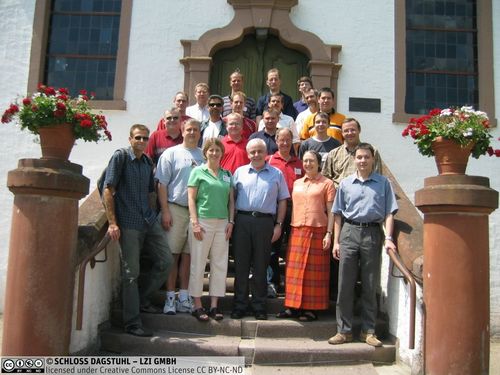Dagstuhl Seminar 05281
Simulation & Scheduling: Companions or Competitors for Improving the Performance of Manufacturing Systems
( Jul 10 – Jul 15, 2005 )
Permalink
Organizers
- John Fowler (Arizona State University - Tempe, US)
- Barry L. Nelson (Northwestern University - Evanston, US)
- Michael Pinedo (New York University, US)
- Oliver Rose (TU Dresden, DE)
Contact
Scheduling is a critical need for manufacturing and service systems, and it is not exaggeration to say that effective and timely scheduling can be the difference between success and failure in an era when customers demand rapid response, product customization and low prices. As a result, there has been an explosion of Deterministic Scheduling papers over the decade with a strong group of researchers from Computer Science, Operations Research, and Industrial Engineering departments.
Discrete Event Simulation (DES) has become a widely used technique to predict and ultimately improve the performance of manufacturing and service systems. In particular, DES is often used in capacity planning, to evaluate order release policies, and to evaluate dispatching policies. However, deterministic scheduling approaches are not often evaluated in this way. There is a well established research community focused on DES issues in Manufacturing and Services, mainly from Computer Science and Industrial Engineering departments. Further, advances in simulation design and analysis methodology is making optimization of DES models feasible.
While both of these research communities are working to improve manufacturing and service system performance, the two groups rarely work together. We propose to bring these two communities together to see if synergistic results from interactions between them can be identified. In particular we intend to investigate issues common to both communities such as:
- Should these techniques be used in combination? There is a clear indication that using simulation to evaluate scheduling approaches in a dynamic factory environment can be very fruitful. In the project "Scheduling of Wafer Fabrication Facilities", which was funded by the Semiconductor Research Corporation and International Sematech, a scheduling prototype based on the Shifting Bottleneck Heuristic was developed. There, the majority of the performance testing of this scheduling approach was done by simulation because it was important to see how well the scheduler behaves in an almost realistic environment.
- If the techniques are used in combination, what is the right way to combine these techniques to obtain an optimal result with respect to factory performance, i.e., improved cycle times and on-time delivery? Due to the fact that little research is done in this area of combining scheduling and simulation there are a lot of open issues, including how to provide both simulator and scheduler with a consistent model of the system on which they are working. It is unclear whether both approaches need the same system model or if different levels of abstraction are useful.
- Is there more than simply validating scheduling approaches by simulation? For instance, can simulation be used to schedule as well as to evaluate scheduling algorithms? Or can simulation be used to determine appropriate planning horizons for scheduling algorithms in the presence of uncertainty? Or could simulation be used to evaluate schedule robustness to uncertainty? Runtimes for computer simulations are becoming smaller as computers get faster. Thus, it becomes possible to use simulation not only for validating schedules but also for decision making inside a scheduling method. This is quite different from using simulation or sampling to optimize a deterministic scheduling problem (as occurs in Genetic Algorithms, for instance). Rather, simulation of the schedule is a component of the search for a good schedule.
- Why has there been so little interaction between the scheduling and simulation groups? What are impediments to more interactions? We see a lot of potential in this interaction, in particular, when practitioners from industry and simulation software developers join the group. The practitioners bring up-to-date problems, while the software developers provide the conduit for technology transfer from research to practice.
The desired outcomes of the conference were:
- Ideas for collaborative research
- Plans to organize sessions at future open conferences
- Special issue(s) of journal(s) based on the conference
- Decision on whether or not to apply for future Dagstuhl Seminar
- Sergei Chubanov (Universität Siegen, DE)
- John Fowler (Arizona State University - Tempe, US) [dblp]
- Carsten Franke (TU Dortmund, DE) [dblp]
- Celia A. Glass (City University - London, GB)
- Stefan Heydenreich (DUALIS GmbH IT Solution - Dresden, DE)
- Thomas Jähnig (Infineon Technologies - Dresden, DE)
- Sanjay Jain (Virginia Tech - Falls Church, US)
- Peter Lendermann (D-SIMLAB - Singapore, SG) [dblp]
- Scott J. Mason (University of Arkansas - Fayetteville, US) [dblp]
- Leon F. McGinnis (Georgia Institute of Technology, US) [dblp]
- Lars Mönch (TU Ilmenau, DE) [dblp]
- Barry L. Nelson (Northwestern University - Evanston, US) [dblp]
- Yuri Nikulin (Universität Kiel, DE)
- Jonathan Owen (General Motors -Warren, US)
- Detlef Pabst (Arizona State University - Tempe, US) [dblp]
- Grzegorz Pawlak (Poznan University of Technology, PL)
- Michele Pfund (Arizona State University - Tempe, US) [dblp]
- Oliver Rose (TU Dresden, DE) [dblp]
- Günter Schmidt (Universität des Saarlandes, DE)
- Alexander Schömig (Infineon Technologies - München, DE)
- Sven Spieckermann (SimPlan AG - Maintal, DE) [dblp]
- Stephen John Turner (Nanyang TU - Singapore, SG)
- Robert Unbehaun (TU Dresden, DE)
- Gerald Weigert (TU Dresden, DE) [dblp]
- Gideon Weiss (Haifa University, IL) [dblp]


